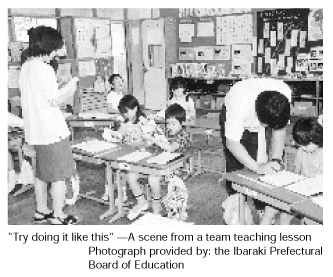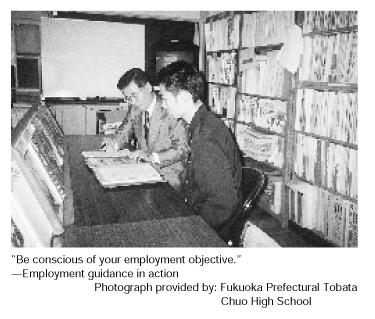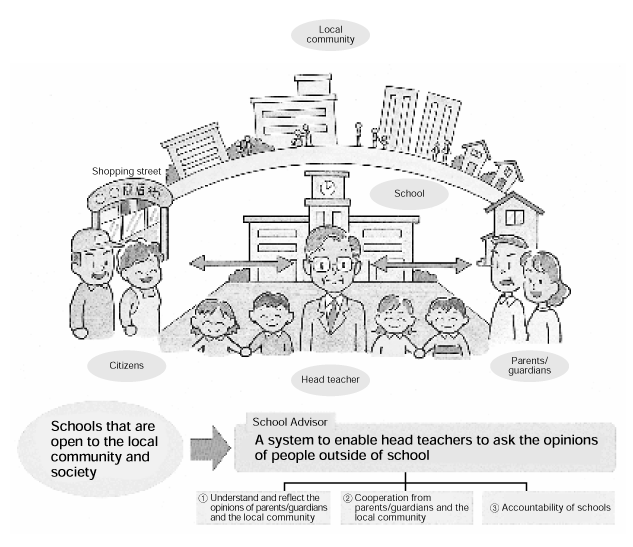| Bringing Citizens From All Walks of Life to the Educational Forum-Emergency Employment Package Projects of Boards of Education- |
In order to respond to the harsh employment situation of late, in June 1999, the Government of Japan produced an "Emergency Employment Package," establishing the "Special Emergency Regional Employment Grant." Local governments are using this grant and tackling projects in accordance with their local situations in order to increase employment and work opportunities. Projects utilizing citizens from all walks of life in the educational forum are actively being conducted by boards of education.
Let us now look at two examples from those projects carried out in fiscal 1999.
| "This time it's our class's turn!" -Enjoyable team teaching (The Citizen Team Teaching Assignment Project -Ibaraki Prefecture) |
(From corporate sports to the educational forum)
In Ibaraki Prefecture, a special grant was used and 354 part-time lecturers were newly employed from the outside in order to get to grips with team teaching at elementary and lower secondary schools.
One of these people is Mr. ONISHI Yuichi (26) who was formerly employed in a bank and active in a gymnastics team as a member of a corporate sports group. However, owing to a worsening economic situation, the team was abolished and as such he ended up leaving his job.
Apparently, he desperately wanted to join the project after hearing about its recruitment of outside part-time lecturers at a time when he was considering aiming to become a teacher in a profession that would enable him to interact with children. This is because he had obtained a teaching qualification during his days at university and used to teach gymnastics to children in club teams and elsewhere.
(Taking advantage of team teaching's special features)
Mr. Onishi took on arithmetic classes for second year to sixth year students at the elementary school to which he was assigned. This was a result of a desire of the part of the school to do something about the failing arithmetic capacities of its children and because of an increasing number of children saying they hated arithmetic.
Mr. Onishi made careful preparations with the teacher in charge and undertook the classes. Mr. Onishi paid careful attention to the pattern of the teacher's lessons so that he was able to develop fine-tuned lessons that can only be achieved through team teaching. This can be seen in the individually tailored advice he gives, for example, he sets new challenges for those children who are quick to catch on, saying "see if you can do this problem," and to those children who work at a slower pace, says "here, you will be able to solve it easily if you approach it like this."
During this time, the children gradually came to enjoy their arithmetic classes, and could be heard saying, "I can even solve difficult problems now" and "I have come to enjoy arithmetic." These results will also be revealed in the survey at the end of the year, and apparently, together with improvements in previous arithmetic capabilities, children have come to like arithmetic given that they can now solve the problems, the result of which is that enthusiasm to tackle arithmetic is also mounting.
Furthermore, thinking that he would spend the most part of his time at the school, even outside of his daily four hours of team teaching, Mr. Onishi became a popular figure among the children, eating school lunches with all students from the six grades on a one-month shift and participating actively in games with them during recesses. At the graduation party for the sixth year students, Mr. Onishi demonstrated for the first time some gymnastic techniques, which are his specialty. Apparently, the children who witnessed this experienced the wonder of being engrossed in one particular subject.
(Talking from his team teaching experience)
Speaking from his experience, Mr. Onishi says, "I have been exposed to the candid emotions of the children and been able to experience the wonder of the profession of being a teacher," and strengthening his resolve to become a teacher, he is apparently now studying hard to do just that.
Moreover, the principal teacher at the school to which he was assigned said, "it was as though he used his youth to communicate with the children from a position more on their level, and a breath of fresh wind blew through the school." It would seem that Mr. Onishi served as a huge stimulus to the teachers at the school.
"Try doing it like this" -A scene from a team teaching lesson

| Let's confront the harsh employment situation together (Enhanced projects including employment at prefectural schools-Fukuoka Prefecture) |
(Employment guidance utilizing experience)
Owing to an annual worsening of the employment situation for graduates of upper secondary schools in Fukuoka Prefecture, the Prefecture employed 45 people, including those with corporate experience in personnel and sales, assigning them as "employment guidance workers" to prefectural upper secondary and other schools where there were high numbers of people seeking employment.
Mr. YAMAMOTO Kenji (53) worked for nearly 30 years in a securities company. He lost his job when the company became insolvent, which made him consider that he would like to return to his home of Fukuoka Prefecture to work. However, since there are age restrictions and other limitations on corporate recruitment, he was faced with a situation in which it was extremely difficult to find a new place to work. At that time, he was contacted by the Fukuoka human resources bank and asked whether he would consider working as a "employment guidance worker."
The job consisted of finding employment information for upper secondary school students and teachers and developing job openings requested by the students. On hearing this, Mr. Yamamoto, thought, "this is the job for me!" This is because he would be able to take advantage of his own previous experience and thought he would certainly be able to offer good advice since he was looking for a job at the time himself.
Mr. Yamamoto told us: "Being a third year upper secondary school student is a precious time both in terms of mind and body. I believe that amid a lifestyle pivoting around schoolwork, looking for a job must be even harder for upper secondary school students than for university students, for whom it is said to be equally as hard, because they neither have ample time to explore job offers themselves nor possess the know-how yet. Furthermore, the status quo is that career guidance teachers neither have that much time to go from company to company obtaining job offers because they have their everyday work, including lessons. Employment for upper secondary school students is currently in a grave situation, and I feel the assignment of 'employment guidance workers' is indeed timely."
(Looking for employment conscious of an objective)
At the upper secondary school to which Mr. Yamamoto was assigned, approximately half of the students due to graduate were applying for jobs. Firstly, he interviewed all of the students applying for jobs when carrying out employment guidance. This is because he considered it important to ask them what sort of job they would like and to remember all of their faces. He interviewed them several times subsequently, but was careful to advise them accordingly each time.
Mr. Yamamoto says the important point about employment guidance is "giving them a sense of an objective." In other words, this is having a clear idea of what you want to do, and why you want a particular job. Partly due to the fact the he himself was formerly in charge of interviews at the company he worked for, he offered guidance on interviews with career guidance teachers while considering the perspective of a corporate employment officer, so that the students would be able to give positive replies.
Furthermore, securing more corporate job placements for recommended graduates was a sizeable part of his work, and his former sales experience was apparently useful in this. Scouring newspapers, magazines and other material related to economics, and studying the results and economic trends of companies, for example, enabled the conversations with employment officers to proceed more smoothly. Mr. Yamamoto visited more than 100 companies in a three-month employment period in order to obtain new or additional placement quotas from these companies.
Mr. OKADA Takashi (graduated 1999) actually received employment guidance from Mr. Yamamoto and told us the following:
"I had been applying for jobs since I entered school, but I had not made up my mind on what sort of work I wanted to do exactly. However, while consulting with my family, career guidance teachers and employment guidance workers, I came to realize that I wanted to do transportation-related work using cars, which I love. Despite the fact that there were no job vacancies related to transport, thanks to the eager searching by the guidance workers, I received a job offer from a transport related company and got it. I am truly grateful to them."
(Visible results)
While carrying out his employment guidance work, Mr. Yamamoto was seemingly encouraged by nothing more than when a student who had been applying for a job would report to him full of joy, "I got the job." Every time he recalls their faces, he apparently firmly wishes that, given the opportunity, he would like once again to be involved with employment guidance as an employment guidance worker.
The vice-principal at the school to which Mr. Yamamoto was assigned said the following:
"The number of students securing informal assurances of employment has risen amid harsh employment conditions thanks to employment guidance workers utilizing their experience to offer positive employment guidance and find employment opportunities. Furthermore, they were also able to link this to the following fiscal year, having secured new placement quotas for job vacancies for recommended students amid employment opportunities that were initially lower than those of the previous fiscal year. Although those students who have received informal assurances of employment by the end of the second term are almost all decided every year, the activities of employment guidance workers assigned to the school in the third term produced visible results, such as students securing informal assurances of employment, even in the third term. I would by all means wish that employment guidance workers be assigned here in the future, too." Furthermore, the vice-principal added that by actually looking at Mr. Yamamoto's activities, he was afforded new opportunities to learn methods to gather information, to visit companies to secure employment opportunities, and to communicate with employment officers, etc., and these also were considerable results. He concluded that he would like opportunities to be of future benefit to employment guidance.
The Fukuoka Prefectural Board of Education is committed to increasing the number of employment guidance workers in the future and stressing the importance of employment guidance.
"Be conscious of your employment objective."-Employment guidance in action

|
